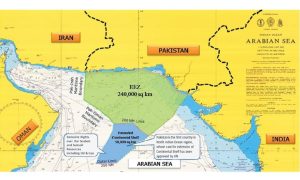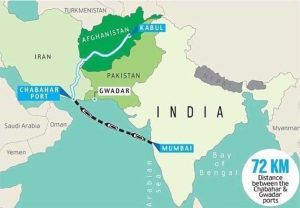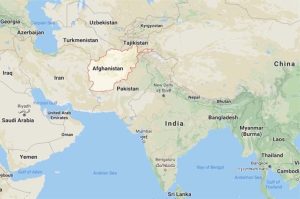UNCLOS and Rights of Coastal States
The United Nations Convention on the Law of the Sea (UNCLOS) grants special rights to the coastal states with regards to exploration and use of marine resources including energy production ,in the area in its jurisdiction at times termed as exclusive economic zone (EEZ) .
Economic Control of Waters
Article 76(4) to (6) of the UNCLOS prescribes a complicated formula for claiming such an extension. The claimant state has to present legal and scientific basis for its claim before a twenty one member commission of experts. The evidence is usually supported by maps to establish that the claimed continental shelf is an extension of its territory and conforms to the description provided in the Law of Sea Treaty of 1982. According to the provisions contained in UNCLOS coastal countries are allowed economic control of the waters and seabed up to 200 nautical miles (nm) from their shores. Further, international treaty allows countries to further claim an extended continental shelf stretching up to 350 nm from the baselines of its territorial sea if the applicant state can establish that the claimed area was a natural extension of their contiguous land territory.
Pakistan’s Continental Shelf
Pakistan approached UNCLOS in the year 2009. Prior to approaching the UNCLOS a four year extensive study had been jointly conducted by the relevant authorities . Subsequently a sub-commission of the UNCLOS on limits of Continental Shelf reviewed and evaluated Pakistan’s case and accepted its claim for extension of its continental shelf limits thereby extending Pakistan’s sea limits from 200 nm to 350 nm . This acceptance in the year 2015 was despite certain of the claimed territory partially overlying an Omani claim .It is believed, in maritime circles ,that this acquiescence was pursuant to negotiations.
Expansion of Offshore Territory and Economic Gains
Following the acceptance of the claim, Pakistan’s offshore territory of 240,000 sq km expanded by another 50,000 sq km as a result it has been granted inherent economic rights to exploit the natural resources contained in it.

Courtesy Dawn March 21st, 2015
Bulk of the law of the Sea in codified form is found in the United Nations Convention on the Law of the Sea signed in 1982. The latter is a body of laws as rules of the international law as well as laws enacted by sovereign states.
According to a 2018 report published by the Trade Development Authority of Pakistan Afghanistan depends on Pakistan for the transit of 55 % of its trade. In the fiscal year 2018–19, a total of 125,000 containers of Afghan goods valued at $ 5.5 billion had transited through Pakistan which further emphasises the dependent nature of Afghanistan on Pakistan for its commercial activities with the rest of the world. Pakistan and India are parties to the UNCLOS as their respective governments have ratified the treaty after signing it whereas Iran and Afghanistan are only signatories to the treaty. However, there is no difference in the special provisions pertaining to landlocked states for parties versus signatories. Part X of the UNCLOS comprises of provisions to protect the rights of landlocked states to access the sea. These provisions include the freedom of transit through a transit state by all modes of transport (road, rail, air and energy pipelines). It also exempts landlocked states from tariffs and duties for transit with an exclusion from the most-favoured-nation (MFN) clause due to the special geographic position. It also lays the general norms for facilitating customs during transit. The port of Chabahar is located off the Makran coast in the Sistan province in Iran providing direct access to the Indian Ocean and is at a safe distance from the tense Persian Gulf. It is situated 790 nm off Mumbai and acts as a bypass for India to reach Iran, Afghanistan and further into Central Asia without having to go via Pakistan. The distance between Chabahar Port and the Iran–Afghan border post is 800 kilometres closer than the distance between the Karachi Port and the Af-Pak Torkham border post. In 2016 India, Afghanistan and Iran signed a trilateral transit and trade agreement in Tehran to facilitate Afghan trade via Chabahar. Under this agreement India agreed to invest US $ 85 million for the development of the port and committed to construct a railway line worth US $ 400 million to connect Chabahar with Afghanistan’s Bamiyan province via Zaranj. India has already built a 215 km highway in Afghanistan that connects Zaranj and Delaram.Relations have reportedly soured between India and Iran.
CPEC favours Gwadar Port
The CPEC connects China’s western province of Xinjiang with Gwadar Port in Pakistan developed by the China Overseas Port Holding Company, a Chinese state owned enterprise. Gwadar Port is also off the Makran coast, 72 km from Chabahar, and gives the Chinese direct access to the Indian Ocean .


https://doi.org/10.1080/09733159.2021.1939869
Iran’s Land Route to Afghanistan
Iran is challenged by poor land transport connection with Afghanistan in order to ship Afghan goods to the Iranian ports of Bandar Abbas and Chabahar. The Chabahar Port project has been undertaken by India to access Afghanistan and Central Asia via Iran bypassing Pakistan. It not only serves Afghanistan as an alternative trade route to Pakistan’s Karachi Port but also promises to develop transport infrastructure across the Iran–Afghan border region.
Hurdles in development of Chabahar Port
However, the Chabahar Port project faces hurdles due to the United States’ policy towards Iran and the economic sanctions imposed by it on Iran. This is a major cause of concern for the stakeholders in the region to support, invest and develop regional infrastructure to facilitate Afghan trade. The Central Asian Republics are hesitant to use the seaports of Iran.The US decision under former President Donald Trump’s leadership to withdraw from the Iranian nuclear deal and the subsequent economic sanctions have raised doubts about conducting regular business transactions with Iran. However, in December 2019 India gained some concessions from the US under the Iran Freedom and Counter-Proliferation Act of 2012 for developing the Chabahar Port and to construct a railway link between the port and the Afghan border. In July 2020 Iran dropped India from the construction of the Chabahar-Zahedan railway line as Tehran decided to build it using its own financial resources. Delays in execution of contractual commitments made by India has also been a factor for Iran to exclude New Delhi from the railway project.Pakistan’s Gwadar Port is a beneficiary of soured relations between Iran and India.
By Nadir Mumtaz

Leave A Comment